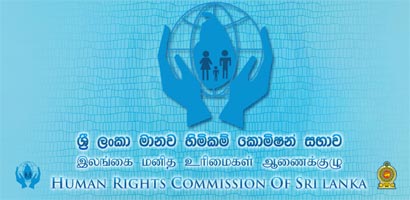 The passage of the new Bill will hinder the efforts of the Government which has expressed its determination to stop torture in Sri Lanka.
The passage of the new Bill will hinder the efforts of the Government which has expressed its determination to stop torture in Sri Lanka.
by Human Rights Commission of Sri Lanka, September 21, 2016
HRC SL Letter-to-PM-on-21.09.2016
Proposed Amendment to the Code of Criminal Procedure Act Depriving Suspects of Access to Lawyers until their Statements are Recorded.
The Human Rights Commission of Sri Lanka is gravely concerned, that the Bill published in the Gazette on the 12th of August 2016, proposing to amend the Criminal Procedure Code, will deprive suspects arrested and detained by the Police of access to Attorneys-at-law, prior to the recording their statement, and will adversely impact on the constitutionally guaranteed rights of persons including the citizens of Sri Lanka”
The Bill proposes to introduce a new section 37A to the Criminal procedure Code. The proposed Section 374(1) states that”any person who hos been arrested and detained in custody, shall have the right to retain and consult on Attorney-at-law of his choice of his own expense, after the recording of his statements in terms of the provisions of subsection (1) of the section 770 and prior to being produced before a Magistrate.”
Although this section purports to give a right to arrested suspects to retain and consult an Attorney at-law, such right is granted only after a statement is recorded from the suspect. Between the time of arrest and until the time of the conclusion of the recording of a statement, the suspects are deprived of access to their Attorneys-at-law.
The new Bill derogates from the rights already guaranteed by the State under Rules made by the lnspector General of Police under the police Ordinance.
The Human Rights Commission notes that as a result of a settlement reached in the Supreme Court in a Fundamental Rights Application, the lnspector General of Police made rules under the police Ordinance cited as Police (Appearances of Attorneys-at-Law at Police Stations) Rules 2012,”recognising the right of a lawyer to represent his/her client at a police station and requiring the officer in charge of the police station to facilitate such representation. These rules effectively recognise the right which all persons including suspects have to access their Attorneys-at-law at any time, including the period immediately after arrest and while being in detention.
The Human Rights Commission has observed that many instances of torture as well as cruel, inhuman treatment of suspects at police stations occur between the period of arrest and the conclusion of the recording of their statements. As such depriving suspects under arrest and detention of access to their lawyers until the conclusions of their statements will result in a greater risk of suspects being subject to torture, cruel and inhuman treatment as well as illegal arrest and detention by errant police officers.
The passage of the new Bill will hinder the efforts of the Government which has expressed its determination to stop torture in Sri Lanka.
The Human Rights Commission is equally concerned that the new provision will impinge on Fundamental Right of a fair trial guaranteed to an Accused under Article L3(3) of the Constitution’ The right to a fair trial begins from the time of investigation. The lack of a fair and impartial investigation will result in the deprivation of a fair trial to an accused. The new provision, depriving suspects of access to lawyers during a crucial stage of the investigation will result in eventually the accused being deprived of a fair trial as a result of an unfair and partial investigation.
Furthermore, granting access to lawyers after the suspects’ statements are recorded and just before them being produced before a Magistrate is of little consequence.
The new Bill is contrary to the accepted international standards of human rights which Sri Lanka is obliged to guarantee to its people. The attention of the Government of Sri Lanka is drawn to the relevant provisions of the lnternational Covenant on Civil and Political Rights (ICCPR). lt has been observed that the right to liberty and security of persons and the right of due process established by law requires the State to permit access to counsel from the inception of the detention and that there ought to be prompt and regular access to lawyers.
The Supreme Court of Sri Lanka has upheld that the Right to a fair trial includes the accused being granted adequate time and facilities for the preparation df the defence and to communicate with counsel of one’s own choosing. This is also reflected in Article 14 of the ICCPR. Sri Lanka’s Code of Criminal Procedure has been criticised by international bodies including the UN Committee Against Torture of lacking ‘fundamental legal safeguards, such as the right to have o lowyer present during any interrogation and…the right to confidential communication between lawyer and client.’
As such, it is necessary to strengthen, not weaken, the right of suspects to have access to lawyers. Especially when Sri Lanka has embarked on a constitutional reform process, including the drafting of a new Chapter on Fundamental Rights that should accord with the highest international and national human rights standards, the presentation of this Bill is all the more problematic.
ln the above circumstances, the Human Rights Commission of Sri Lanka calls upon the Government of Sri Lanka to withdraw the aforesaid amendment to the Code of Criminal Procedure and to continue to recognise and enhance the rights of suspects to have access to their lawyers.